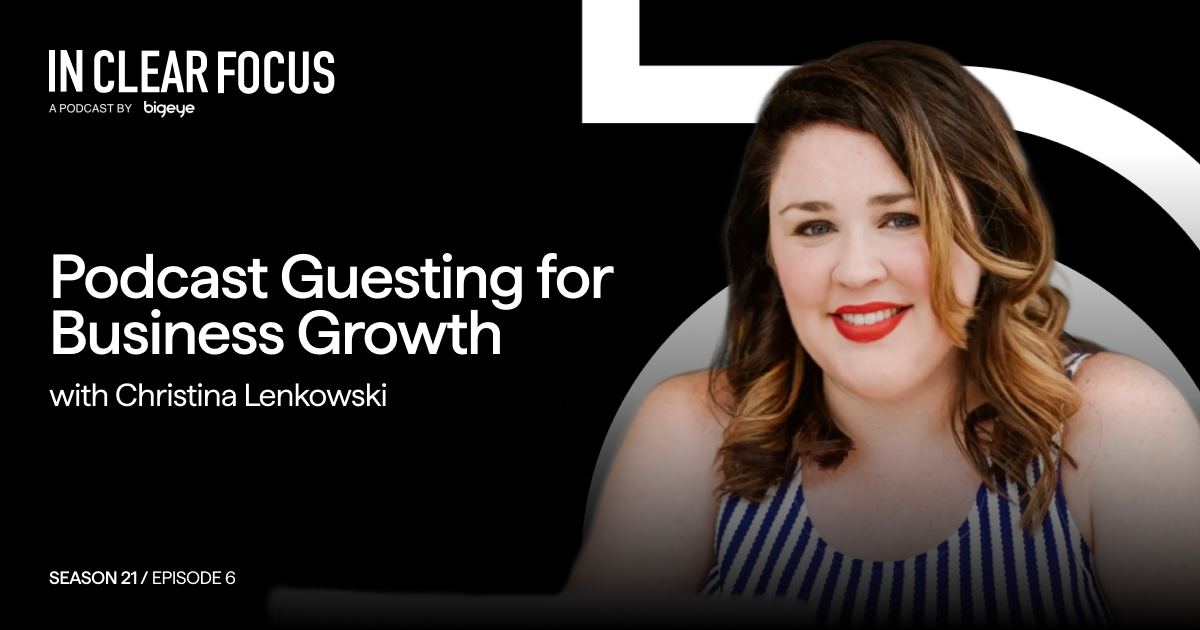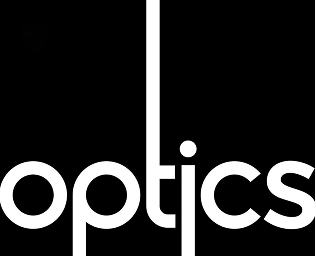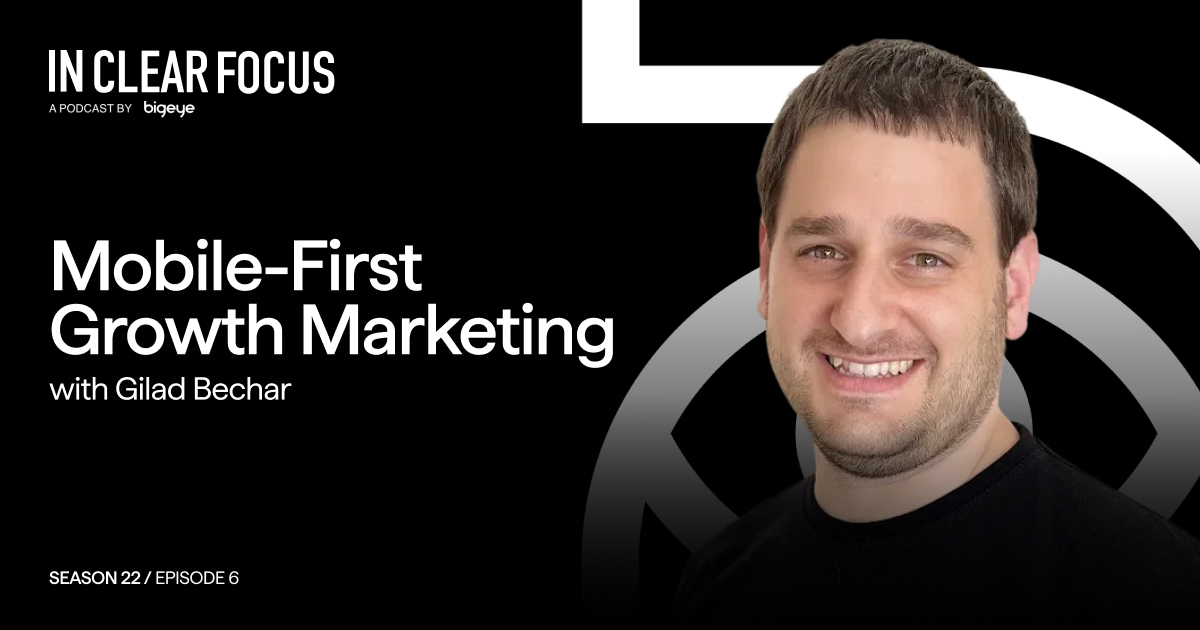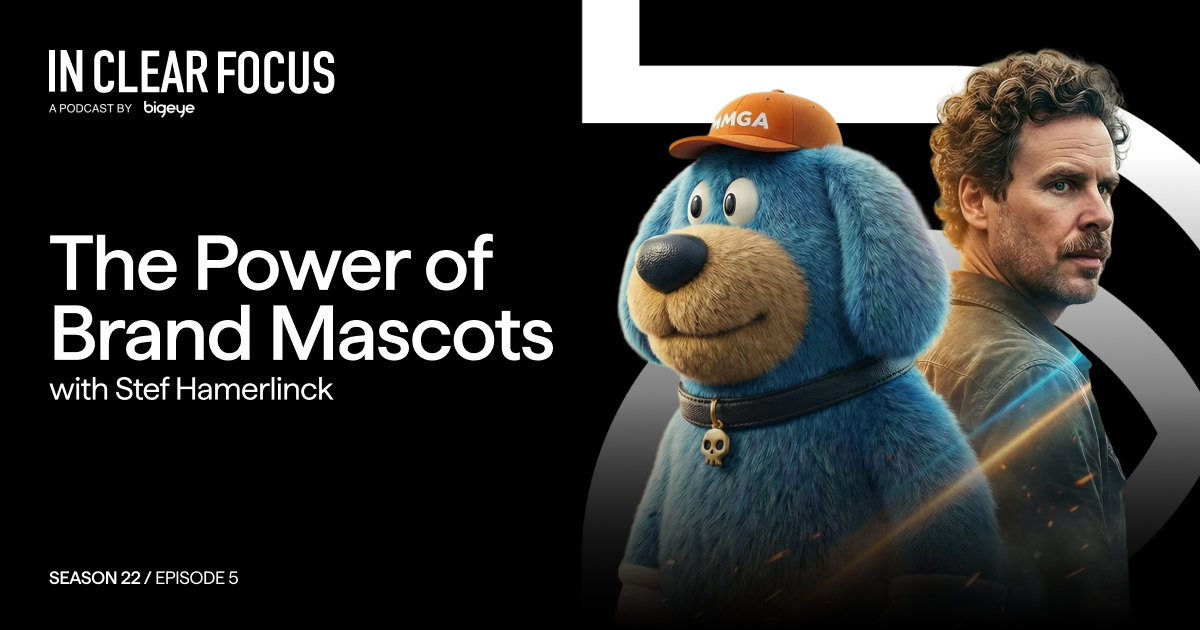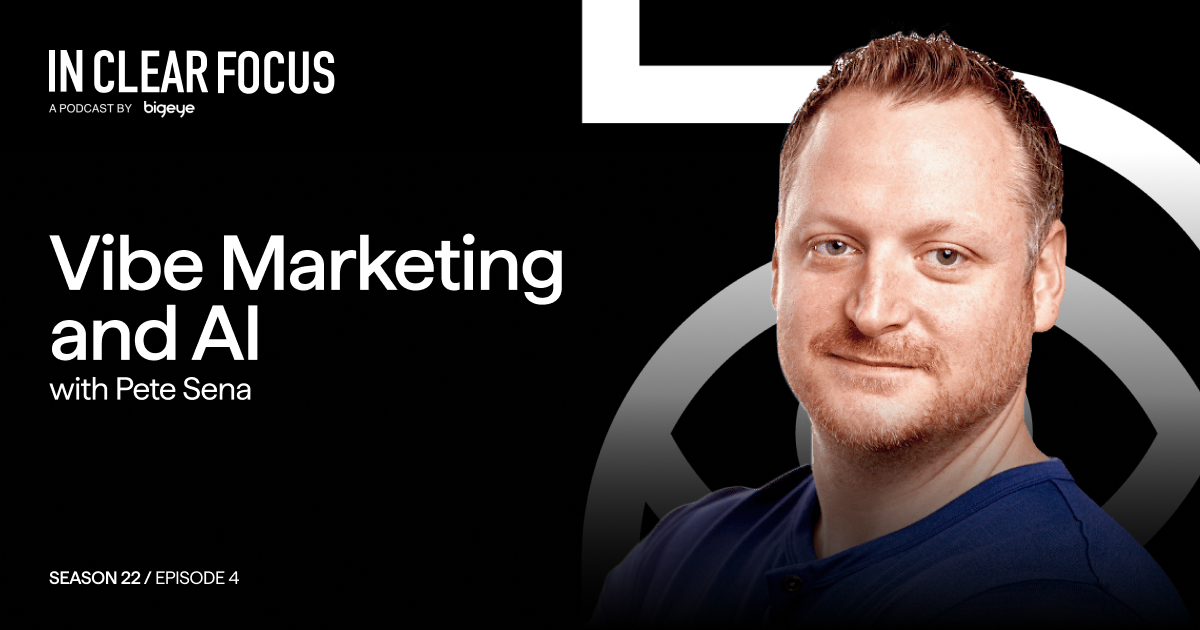IN CLEAR FOCUS: Forget chasing big-name podcasts. This week’s guest, publicist Christina Lenkowski, reveals why the real money is in guesting on niche shows packed with your ideal audience. She explains how to use podcast guesting as powerful earned media to be someone prospects “know, like, and trust.” Learn the secrets to a successful pitch, the importance of service over self-promotion, how to avoid common mistakes, and why this strategy is a long-game for generating warm, qualified leads.
Episode Transcript
Adrian Tennant: Coming up in this episode of IN CLEAR FOCUS:
Christina Lenkowski: Where our clients make money is by showing up on the shows that are full of their ideal audiences, even small shows, even shows that are extremely niche. If those are the right audiences for them, that is where those new customers come from and where they’re going to really be able to use that content for years to come.
Adrian Tennant: You’re listening to IN CLEAR FOCUS, fresh perspectives on marketing and advertising produced weekly by Bigeye, a strategy-led full-service creative agency growing brands for clients globally. Hello, I’m your host, Adrian Tennant, Bigeye’s Chief Strategy Officer. Thank you for joining us. According to Edison Research’s 2025 Infinite Dial Report, 73% of Americans aged 12 and older have consumed a podcast in either audio or video format. That’s approximately 210 million people. Fifty-five percent are now monthly podcast consumers, representing an all-time high. But here’s what matters for marketers: Podcast audiences are deeply engaged, with 80% listening to all or most of each episode. Yet, while many businesses focus their efforts on creating their own podcasts, far fewer recognize the opportunity that exists in being a guest on other people’s shows. Our guest today is an expert in helping entrepreneurs, authors, and thought leaders leverage this opportunity. Kristina Lenkowski is a publicity strategist and the founder of Publicity by Kristina, where she helps clients go from best-kept secret to go-to expert through strategic podcast guest appearances. With over 15 years of experience in public relations and marketing, Kristina and her team have secured more than 1,000 podcast recordings for clients on top-rated shows. She’s also the host of Your Podcast Publicist and a sought-after speaker on the power of earned media. To discuss how podcast guesting can drive business growth, I’m delighted that Christina is joining us today from Boise, Idaho. Christina, welcome to IN CLEAR FOCUS!
Christina Lenkowski: Hey, Adrian, thank you so, so much for having me here today. I am really, really excited to talk to your audience about something that’s kind of meta on the podcast today, which is why you should be showing up on podcasts to get in front of your ideal clients, customers, audiences, et cetera.
Adrian Tennant: Well, let’s get into it.
Christina Lenkowski: Let’s do it.
Adrian Tennant: Christina, you spent over a decade in traditional PR and marketing before discovering podcast guesting in 2019. What was it about this particular medium that made you pivot your entire business focus?
Christina Lenkowski: Yes. Like you mentioned, I had worked for over a decade in traditional agencies and also in-house doing PR and marketing for some companies all over the United States. And I started my own company in about 2015, 2016. And I did what a lot of people do is – I started a new business. And even though for me in particular, my business was about publicity, I did no publicity to promote it or anything like that. I was just following what the gurus at the time were saying to do, and therefore wasn’t really leaning back into my intuition or all that work that I had already done. And so I had this course, I went to go sell it, it did not sell well. And the next time I went to go do it, I was like, “Alright, now we’re doing it my way. Okay, like now I’m ready to get out there and I’m ready to do it in the way that I know how to do, which is publicity.” And at that point, this was probably like 2018 or so, podcasts were a thing, but they weren’t the thing that they are now. You know, they weren’t a part of everyone’s life, basically, or they have a favorite one or etc. And I started to guest on podcasts. And quite frankly, the difference in my business was night and day. People reaching out to me to see about having me come speak on their stages, people just purchasing my course, or the other things that I had to do. Right off the bat, there was no nurturing, there was no webinars, there was no anything because those people really felt like they could know, like, and trust me. And so when the pandemic hit, I really pivoted full force into this. And the reason that I believe in it so much is, just like I mentioned, that know, like, and trust factor is really authentically built. You’re able to tell your story. People are really able to get a sense of who you are. Whether they like that or not, that’s okay, but they really get an idea of whether you’re someone they want to work with, learn from, you know, or even just think about something differently based on something you say.
Adrian Tennant: Christina, how would you define publicity, and where does podcast guesting fit within that definition?
Christina Lenkowski: Publicity is part of earned marketing. And so for me, marketing goes into three different categories: owned, earned, and paid. So paid is, in a shock to no-one, things you pay for, ads, influencer campaigns, etc. Owned are the things that you have some control over, right? Like, unless Mark Zuckerberg is listening to this, no one that’s listening owns Meta, owns, you know, these other platforms. But you do own the content that you put out onto those platforms, right? You are the one who’s deciding what you’re saying, etc. And then earned is where there is no money exchanged, and you are providing value to another platform. So that could be podcast guesting. That’s also where, if you maybe do a TV appearance, a radio, maybe you get featured in a magazine, things like that. Those are all what we consider publicity earned media, which is, again, where you are going out on someone else’s platform. No money is exchanged, and you’re providing value.
Adrian Tennant: Why does earned through podcast guesting offer unique advantages over the other two?
Christina Lenkowski: By far, you are getting the most deep dive, authentic look at that person. You are literally hearing their voice. Again, I did traditional PR for a long time, and there is value in that as well. But when you’re just quoted in an article, or maybe you have a 30-second thing on TV, again, these are great, but they don’t give someone an opportunity to really get to know you, to really feel like they have a certain vibe about you, feeling about you, and really pique their interest to want to learn more.
Adrian Tennant: Well, many of our listeners might assume that podcast hosts are actively searching for guests. Of course, that’s true some of the time. Christina, what’s the reality of how most podcast bookings actually happen?
Christina Lenkowski: Yes. And I bet Adrian, you’re going to have some good insight into this as well for the people that are listening in. But yeah, I kind of look at pitching and guesting a lot of the ways that people look at like, award shows, or how I thought award shows work. So up until I was way too old to think this, I thought that award shows were like someone just recognizing, “Hey, you know what, they are doing a great job. We should give them an award.” Like someone just noticing that person. And that is not at all how it works. When it comes to these award shows, you are applying to win this award, you are being judged by a panel of people who are deciding if you are the one that’s going to win this award. There may be some politics in the back end and all that stuff too, right, depending on what it is. But then they are going to give that award to whomever they deem the most worthy of that. And a lot of times, that is the way that you should be looking at pitching and pitching yourself to podcasts, or other things too. You have to apply to these opportunities. Hosts aren’t just out here for the most part searching for people that they want to have on their podcast. You need to make it as easy as possible. This is what I like to say. This goes back to my journalism days. “Make it as easy as possible to get the yes.” OK, so we like to come to a host and say, “Hey, we already know what your show is about. We know what your audience is looking for. Here are some things that either Christina or one of our clients could be talking about on your show. What do you say?” We’re just making the best case that we possibly can. And we get no’s. Trust me. Like, you know, to be very clear that that happens. You know what I mean? But we are making the best case that we possibly can to get one of those coveted spots. So for a lot of people, they sit back and they think the podcast will come to me. And for the most part, that is not how this works.
Adrian Tennant: Well, in your experience working with hosts who, like me, have been doing this for several years, what have you found separates a pitch that gets a yes from one that just gets ignored?
Christina Lenkowski: I think you could probably give some good insight here, but for me, what I really think makes the big difference is having really great topic ideas that that audience is going to really want to hear about. You know, I was talking earlier about, hey, you build this know, like, and trust. You’re the guest on the show, but I’m not on here to talk about me. We are on here to talk about podcast guesting. I’m on here to talk about what that looks like in a business or for your business or things like that. And I think this is an important distinction for people to understand, is you are there to provide value to this host’s audience. You are not there to talk about you. And when you come at it from that angle, that service over self-promotion, and you have really solid topic ideas that show that you know what their audience wants to listen to, that’s when you will get a yes.
Adrian Tennant: 100% agree.
Christina Lenkowski: Love that, Adrian. Love it. Yeah.
Adrian Tennant: Well, let’s talk about the perfect fit versus big name dilemma.
Christina Lenkowski: Yes.
Adrian Tennant: So, Christina, should businesses focus on the largest possible shows or the most aligned audiences?
Christina Lenkowski: Absolutely, with no question the most aligned audiences. Sometimes people come to me, and they’ll be like, “Yeah, yeah, yeah. I just want to get on, I don’t know, like Joe Rogan, maybe Oprah, you know, whatever.” And, and I’m like, “Okay.” And mainly because the reason I have that reaction is that is in no way what their ideal audience is. They just know that those are the biggest names in the podcasting world. And so that’s the only thing that’s going to be worth my time to do that. And I am here to tell you that we’ve gotten our clients on some big shows. That’s wonderful. But where our clients make money, which is what all of us business owners are out here to do, is by showing up on the shows that are full of their ideal audiences, even small shows, even shows that are extremely niche. If those are the right audiences for them, that is where those new customers come from, where that money is made and where they’re going to really be able to use that content for years to come.
Adrian Tennant: Christina, you coach your clients not to overthink their responses to maintain authenticity. How do you balance preparation with spontaneity?
Christina Lenkowski: Yeah, so for me, and the thing that I coach our clients on, is I don’t want you to be rehearsing a script. That’s not what we’re here to do. You’re going to make people be like, “Oh, are they a robot? Like what’s going on here?” You know, is this, they’re just kind of repeating things that are going to be there. So what I really recommend for my clients and what I do personally, is within 48 hours of guesting, I will listen to an episode of the show. So I will listen to an episode that I’m genuinely interested in. What I mean by that is I’m not necessarily listening to the last episode, like the episode I was just listening to of your show, Adrian, was from, I believe, about a month back. And I was like, “Oh, this is something I really want to kind of hear about, listen about.” And I do it when I’m on my walk. I do it when I’m taking my kid to school. This isn’t like I’m sitting down taking notes type of thing. It’s just more of a, “What are some of the questions that I know he maybe asks his guests when they come on? What is the general vibe of this show? Can I swear? Can I not?” You know what I mean? These are all kinds of things that I’m thinking about when I’m listening to the show. That’s a really great way for people to kind of take a beat, take a second, and be like, “Okay, this is what this show is actually about. This is what this host is about.” Even if you’ve already listened to the show before, like it’s a show that you regularly listen to, I always will listen to an episode at least 48 hours ahead of time to kind of get back in the zone. We always like to make sure that our clients know what topic the host has decided they want to speak about. That’s really helpful for our clients to get an idea. But with that in mind, it’s a conversation. It could go anywhere. People want to know you. And this is all muscle memory. At this point, I’ve been on over 100 podcasts. So I feel really comfortable with listening to my podcast, knowing what topic we’re gonna talk about, and then moving forward from there. I understand if this is your first podcast, you’re not gonna have that same level of comfort. But listening to the show beforehand, having an idea on the topic, know that you’re probably gonna sweat and stumble your way through your first couple shows. It’s all good. But by the time you hit five, 10, you are gonna feel a lot more comfortable to just have the conversation. You are the expert.
Adrian Tennant: What are the most common mistakes you see people make when they try to pitch themselves for podcast appearances?
Christina Lenkowski: Oh, so many, so many. Um, but really, what I would say are the main things that I also hear from hosts saying that frustrate them is when they can clearly tell someone does not know what their show is about. They send a pitch, and you can tell that it was just a bulk pitch. It has nothing to do with your show. Basically, you know, I have multiple friends that have shows that are for women entrepreneurs, like very specifically women in business, and they will get pitched men all the time. The show is literally like women in business. You know what I mean? Like, “You’re like, what?” And that is just an automatic annoyance, deletion, et cetera, from a lot of hosts. And so I would say that’s really, quite frankly, kind of the main thing is when there’s a bulk pitch, whether it’s an agency, whether it’s a representative, or whether it’s the actual person themselves, have never taken a look at your show, have no idea what it’s about. They’re not even using your first name. Those are just really prime examples of what not to do.
Adrian Tennant: I can also 100% relate to that. Let’s take a short break. We’ll be right back after this message.
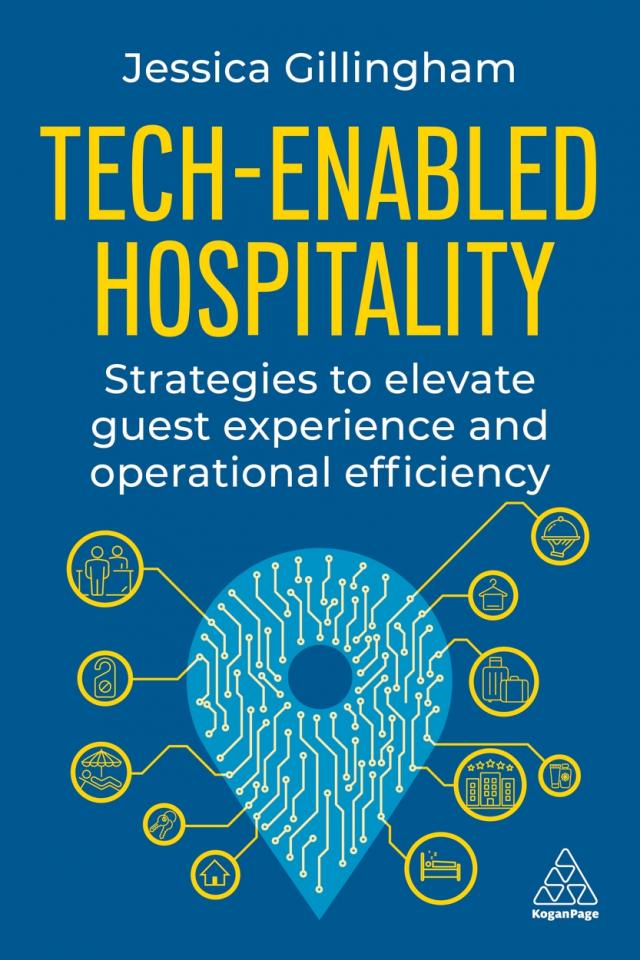 |
Jessica Gillingham: Hello, I’m Jessica Gillingham, author of Tech-Enabled Hospitality: Strategies to Elevate Guest Experience and Operational Efficiency, published by Kogan Page.
I’ve drawn on interviews with 38 senior leaders across 13 countries and insights from brands like Stripe, SiteMinder, Rocco Forte, Hostaway, and Islands Hotel. My book provides marketers with a strategic framework for understanding how technology is transforming guest expectations and behavior. Whether you’re marketing hospitality brands, destinations, or related services, you’ll discover how personalization, AI-driven insights, and digital guest journeys are reshaping the landscape — and learn how to craft marketing strategies that balance innovation with authentic human connections that drive loyalty and lifetime value. As an IN CLEAR FOCUS listener, you can save 25% on Tech-Enabled Hospitality when you order directly from KoganPage.com. Just enter the exclusive promo code BIGEYE25 at checkout. Shipping is always complimentary for customers in the US and the UK. I hope my book helps you develop marketing strategies that resonate with today’s tech-savvy travelers. Thank you! |
Adrian Tennant: Welcome back. I’m talking with Christina Lenkowski, founder of Publicity by Christina, about leveraging podcast guesting for business growth. Christina, beyond the initial podcast interview, you talk about podcast guesting as a long game. How should businesses measure the return on investment of their podcast appearances?
Christina Lenkowski: It really is a long game, and I wanna give a prime example of that is I was on a show in 2024, and I wanna say March or April is when the show actually aired. So I probably recorded it a couple of months before that, a month or two before that, whatever. And, you know, it was a great interview. It went out. We posted some snippets of it, et cetera. But I got a LinkedIn message about six months later from someone, and they were like, “Oh, I heard you on this podcast. I really liked what you had to say. It was just an interesting point of view I hadn’t thought about before.” This was an ads agency owner. And we talked a little bit ended up hopping on a discovery call and he ended up becoming a client a couple months later, he literally signed up December 31, 2024. So that was about nine months between when that episode aired to when I had this client come through the door. And that is not uncommon. And so I think this is a really important thing for people to know is like, I think a lot of people think of publicity, sometimes they feel like it should be like ads. Like, “Oh, I put this much money in, this much money came back.” That’s not really how this works. This is going to be more for that long game, but it’s going to give you really warm leads. That person that reached out to me on LinkedIn, they’re already sold, basically. Like, we just had to have a conversation, but they’d already listened to that whole podcast interview. You know, and this was like a podcast for digital agency owners, like very, very specific to go back to that niche thing that we were talking about. You know, and for him, that was enough. Like he was “OK, let’s hop on a call.” But I mean, he was pretty much already there. The other really nice thing that business owners should think about when it comes to podcasts and the long game is the huge amount of content that you can be creating off of podcast interviews. What podcast interview can be giving you a blog post, multiple social media posts, an e-newsletter, right? Or part of an e-newsletter. There are so many different ways to be utilizing this. When people talk about, “I just struggle all the time to do content. You know, I’m really struggling with what I should be putting out there.” I’m like, “Either you should be guesting on more podcasts or you should be taking the podcast you’ve already been on, chopping them up, doing a blog post.” There are amazing tools out there that can help you do that.
Adrian Tennant: Well, you’ve helped secure over a thousand podcast appearances for your clients. So Christina, what’s your process for matching the right client with the right show?
Christina Lenkowski: I think what we spoke about earlier, it really comes down to finding shows that are the right audience, making sure that they are that exact right fit for the client and then sending a pitch that that host can’t deny. And it’s not sexy. It’s not, you know, the easy quick fix that people want. We are doing research. A lot of what we do as publicists is research. And so I would say that that’s really the main key to the process is knowing exactly who you want to get in front of and then looking for those shows that are exactly that or at least like in that realm.
Adrian Tennant: When we were preparing for this interview, you mentioned to me that podcast guesting can lead to other opportunities, such as speaking gigs and masterminds. Christina, can you share an example of how one podcast appearance created a cascade of opportunities for a client?
Christina Lenkowski: Oh, absolutely. I mean, again, I’ll go back to one for myself. Just at the end of last year, Q4 of last year, I was on a podcast that was for people that were starting memberships. So they were going to start online memberships. And so what I did was I guested on the podcast for this particular host. We had a great conversation, a great call. And at the end, I was like, “Hey, I know you have this membership that you’re starting that’s all about people that are starting memberships. I would love to come and speak in your group all about podcast guesting, etc.” And they were like, “Absolutely.” Again, at that point, I’m saying, “Hey, this is a value add for you. Thank you for having me on your show. I appreciate it. Now let me provide some value to you. I’m happy to come and speak in your membership. I’m happy to give a little mini training, etc.” And they took me up on that. A lot of hosts take me up on that if they have a community that makes sense for that. And so then I went in and I did this training in that community. And from that we got a new client and then I had multiple VIP days booked as well. So people that wanted us to create all their assets and get them ready to go. So the thing I like to point out about this is like the podcast interview a lot of times is just one part of this work. The podcast interview is one part. It goes out. That’s great. You can get all that content from it. You get some leads from it. That’s wonderful. Obviously, we have had clients come through from it. Love that. But a lot of times where I make a lot more of my money is on that back end. So that host communities, host memberships, host masterminds, etc. So do not sleep on that. If podcast guesting is something that you’re really thinking about for your business, is don’t just be like, “Oh, we’re done, bye.” There’s a lot more opportunity there for you.
Adrian Tennant: Interesting. You work with many traditionally under-recognized entrepreneurs, particularly women, LGBTQIA+, BIPOC, and neurodivergent business owners. How does podcast guesting level the playing field for these groups?
Christina Lenkowski: I think the amazing thing about getting under-recognized groups onto podcasts is a lot of people feel that it’s much more authentic. They really, when they hear someone that they relate to, they feel that message in a much different way than they would from someone that they feel like they have nothing in common with. And I think for a long time, there was just a lot of people, you know, kind of anyone with a mic out there, and people were struggling to find who actually represents what I think and the way that I look at the world and the way that I view things, right? I mean, I have a different point of view as a mother than a man would have, right? And so I think that people want to be able to see themselves in other people. They want to be able to be like, “Oh, this person gets it, they understand, you know, what it’s like to be in my shoes” to a certain extent. And so that’s why I love to get those voices out there. And why I think that those voices work particularly well on podcasts, is our clients will get DMs, emails, etc, from people that hear them on a podcast and are like, “You literally told my story, like even those your story, you’re telling my story.” And that has been either bringing clients in, but also business collabs, other things, more podcasts, more stages, et cetera, when people really hear that message and they resonate with someone.
Adrian Tennant: How do you help your clients identify their most compelling stories?
Christina Lenkowski: We actually do a messaging session first off. So with all of our clients, the very first thing we do is a messaging session. It is so important to be clear on those messages that you want to get out there, but that is the main way that we do it. That’s something that obviously people can do on their own as well, but you do need to really identify what are those couple core things that I’m wanting to get across when I show up on these stages.
Adrian Tennant: Of course, AI and automation has had a big impact, certainly on the post-production side of things. How do you see it affecting the podcast pitching process?
Christina Lenkowski: Yeah, I mean, we utilize AI in certain parts of our podcast pitching process, the main thing being research. You know, once we’re clear on a client, when we know who they want to get in front of, when we have that messaging work done, you better believe I’m putting in a deep search on – I call her Chatty G, we all have our names for our AI tools – but I put it in Chatty G, and I let her do a deep research run, you know, I’m like,”Hey, what are 20 shows that this feels like this client could be a good fit for?” And I wanna see what it comes up with. I’m not gonna pitch all those shows probably, but I wanna see what it comes up with and if there’s some things that I hadn’t thought about. And usually there are. I think that there are some really cool ways to be using ChatGPT in this way. Now we don’t have ChatGPT write our pitches. That’s something that we still do internally, you know, and as a human, et cetera, in that way. but I do love using it for research. And that’s the main way that I really see it impacting the podcast space. I think more and more people will start to use it as a research tool in that way for podcasts. And then to your point, there’s a lot of really great ways to use it on the backend to create content and get stuff out there even more.
Adrian Tennant: Christina, I’m curious, how has the podcast landscape changed since you started focusing on this in 2019, particularly in terms of what hosts are looking for?
Christina Lenkowski: So one of the biggest things that I personally have seen change is that kind of in 2020, 2021, we all just wanted to hear different voices than the people that lived in our own homes, right? Like, I feel very much like I was with my family. I was like, “I love y’all, but I’m going to go up in this bedroom and I’m going to listen to somebody else that is not you for a little bit of time” or whatever. And I think a lot of people can relate to that. And so I think in that timeframe, 2020, 2021, when podcasts exploded, I mean, just like through the roof, a lot of people were doing a lot of podcasts, but weren’t as deep. They were kind of interested in a lot of different things. Maybe, hey, that was our learning era, right? We were all in our sourdough era. We’re all learning new things. We wanted to kind of dive into a bunch of different stuff. Nowadays, I feel like people listen to less podcasts, but they go way deeper. So they might have instead of 10, that literally the average was eight in like 2020, 20, you know, probably 2022. The average was around eight, my guess now would be people are more like three to five. But those three to five, they go really, really deep on like they are listening every week, they follow that host, like they feel like they know that host, you know what I mean? And I get this way. I have a couple of favorite shows that I am like, if I could, if even if I just heard their voice in public, I would be like, “Oh my god, that’s, that’s them!” You know what I mean? And I go to podcast events, like I go to Podcast Movement, And it is interesting to meet some of these hosts and things like that, because you myself included, you see people absolutely like fangirl and fanboy over these people feel like we know them, you know what I mean? They’re just trying to get their breakfast at a conference. And I’m like, “So remember when you said this …?” Like, you know, very like talking to them about whatever. I’m sure they’re like, “Could you not?” But that is how I feel like we really are now as listeners. I’m even thinking about in my own household, my husband and me, I have podcasts that I listen to every single week, you know, religiously. My husband also has podcasts that he listens to every single week. And then we have a podcast or two that we listen to together. And I think that that’s how a lot of people kind of are in this space and in this time. So I really think like I said, in short, it’s not as much the like wide and shallow, it’s the smaller but really deep, which is amazing when you get on shows. Because that means that like the people that are listening to that show regularly, they’re locked in, they’re like, “I listened, I trust this host, I love this host,” you know, kind of whatever they say, like I’m into they bring you on, I trust you immediately type of thing. That’s exactly what we’re looking for. When it comes to what hosts are looking for, I think a big thing is, it all comes down to research, is knowing what they’ve already talked about and what you think you can bring a new, fresh perspective to. You know, one thing that I always like to say to people is, I’ll talk to folks and they’ll be like, “Oh, well, I really would love to pitch this show, but they’ve already had someone that does what I do.” So find a different angle, find a different topic, right? That doesn’t mean that you can’t be on that show. And in fact, what that shows me is they’re interested in having someone with your skill set on that show. You just need to make sure that you recognize that you’re not pitching the same thing that that other person talked about. You want to make sure that you’re pitching something different, something fresh, something unique. And I think that that’s a key distinction to make when you’re pitching is make sure that you’re just bringing a new perspective. We even have me going on some shows in the coming months where I was on them in 2020, 2021, 2022. to give almost the question you just asked me to do a whole episode on like, how have things changed? So again, I’ve already even been on a lot of these shows, but the hosts are wanting to have me back on to talk about how things have changed and updated over the years since I’ve been on there. So there’s a lot of opportunities still out there. You just need to find what those angles are.
Adrian Tennant: Great conversation. Christina, if listeners would like to learn more about your work at Publicity by Christina, or explore how podcast guesting could work for their business, what’s the best way to do so?
Christina Lenkowski: Head on over to podcastpublicityquiz.com. And I have a great interactive quiz there that’ll direct you in what way you think might make the most sense for you, whether that’s DIY or someone that wants to handle your own pitching, or you’re someone that thinks maybe we could be handling that on your behalf, like in a VIP day or to be a regular pitching client. But it’s a really fun quiz. People always comment on it. It’s very interactive. You get to see my face in there, et cetera. And yeah, that’s a great way to find out more.
Adrian Tennant: Perfect. Christina, thank you very much for being our guest this week on IN CLEAR FOCUS.
Christina Lenkowski: Thank you, Adrian.
Adrian Tennant: Thanks again to my guest this week, Christina Lenkowski, founder of Publicity by Christina. As always, you’ll find a complete transcript of our conversation with timestamps and links to the resources we discussed on the IN CLEAR FOCUS page at Bigeyeagency.com, just select ‘Insights’ from the menu. Thank you for listening to IN CLEAR FOCUS, produced by Bigeye. I’ve been your host, Adrian Tennant. Until next week, goodbye.
TIMESTAMPS
00:00: Introduction to Podcast Guesting
00:25: The Rise of Podcast Consumption
01:28: Meet Kristina Lenkowski
02:41: The Shift to Podcast Guesting
04:43: Defining Publicity and Its Categories
06:16: Advantages of Earned Media Through Podcasting
07:03: The Reality of Podcast Bookings
09:05: Crafting a Successful Pitch
10:11: Choosing the Right Shows: Fit vs. Fame
11:20: Balancing Preparation and Authenticity
13:35: Common Mistakes in Podcast Pitches
14:43: Break for Sponsor Message
16:08: Measuring ROI from Podcast Appearances
18:57: Matching Clients with the Right Shows
19:50: Creating Opportunities Beyond the Interview
21:51: Amplifying Under-Recognized Voices
23:21: Identifying Compelling Stories
24:01: Impact of AI on Podcast Pitching
25:11: Changes in the Podcast Landscape
29:17: Conclusion and Resources
